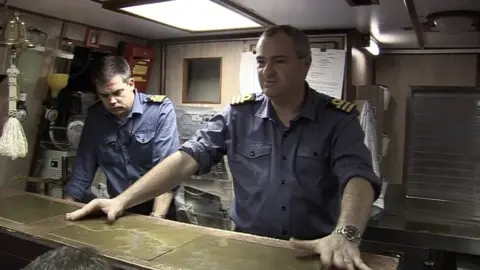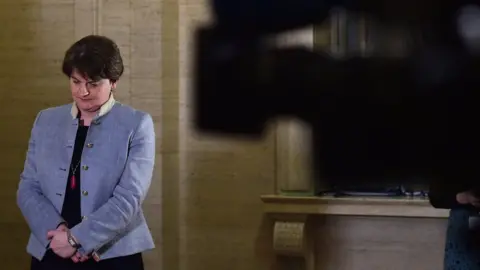Steve Aiken: From submariner to Stormont party leader
 Pacemaker
PacemakerSteve Aiken had to navigate difficult waters from the moment he took charge of the Ulster Unionist Party (UUP).
The party's third leader in three years, the former Royal Navy commander set out hoping to steady the ship in November 2019.
However, his brief tenure saw the party, and unionism in general, troubled by the fallout of Brexit and Irish Sea border.
Now, the 58-year-old has confirmed he will step down as UUP leader.
Submarines to Stormont
Steve Aiken was born in 1962 and grew up in Newtownabbey, County Antrim.
He completed a degree in defence studies at King's College London before pursuing further qualifications at Cambridge.
Mr Aiken joined the Royal Navy in 1980, commanding a nuclear-powered submarine and also serving on nuclear-armed vessels, before retiring in 2011.
During his working life at sea he earned his nickname Submarine Steve.
He was also made an OBE and awarded the US Meritorious Service Medal for his service in the Middle East around the time of the wars in Afghanistan and Iraq.

After more than three decades' naval service, Mr Aiken spent a number of years in the commercial sector and was chief executive of the British-Irish Chamber of Commerce and of the Dublin City University Educational Trust.
He credited conversations with then-UUP leader Mike Nesbitt for inspiring him to run for elected office, after admitting he only developed an interest in politics later in life.
He became party leader after being elected, unopposed in November 2019.
At that time, he had only three years' experience in the Northern Ireland Assembly, having been elected to represent South Antrim for the first time in 2016.
 Pacemaker
PacemakerBut his path was not smooth.
Before he took up the job, Mr Aiken was accused of having "shot himself in the foot".
He initially ruled out a general election pact with the Democratic Unionist Party (DUP), even though unionist parties have traditionally agreed pacts in certain constituencies to maximise the number of unionist MPs at Westminster.
After widespread criticism, the UUP decided it would not contest North Belfast, where DUP MP Nigel Dodds faced a strong challenge from Sinn Féin.
Lord Dodds lost his seat anyway, but the U-turn had already damaged the incoming UUP leader.
Centenary week
Mr Aiken's resignation leaves both Northern Ireland's largest unionist parties without clear leadership as unionists mark the centenary of Northern Ireland,
The UUP is Northern Ireland's oldest unionist party and for decades it was also its biggest, and most powerful, political force.
In more recent years it has been overtaken by the DUP, which has become the voice of mainstream unionism.
The DUP is currently holding a leadership contest, after its leader Arlene Foster faced a revolt from senior members at the end of April.
 Getty Images
Getty ImagesHer resignation announcement, and now Mr Aiken's departure, show the depth of the crisis in unionism following the implementation of the Irish Sea border in January 2021.
The new post-Brexit trade arrangements - known as the Northern Ireland Protocol - were agreed by Boris Johnson's government in October 2019 - just weeks before Mr Aiken was elected as leader of the UUP.
Unionists had campaigned against the deal, arguing that it places an economic barrier in the Irish Sea and undermines Northern Ireland's status as an integral part of the United Kingdom.
 Pacemaker
PacemakerLast month, loyalist anger over the Irish Sea border was cited among the reasons for sporadic rioting in several parts of Northern Ireland.
In March, unionists were outraged by a decision by the Public Prosecution Service (PPS) not to prosecute anyone over the June 2020 funeral of senior IRA man Bobby Storey.
Following the PPS decision, Mr Aiken called for the resignation of PSNI Chief Constable Simon Byrne.
His subsequent interview with BBC's Stephen Nolan was described as a "car crash", as he struggled to explain his party's reasoning behind the decision.
In his resignation letter, Mr Aiken said he had taken the party "as far" as he could.
He will not be leaving politics, but has agreed to stay on in his role until a successor is found, at his party's request.
